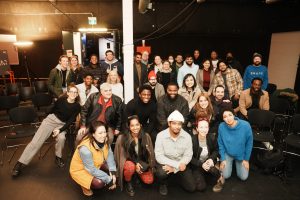Guiding Principles
For Theatre@York season selection and guest artist invitations

Theatre @ York is committed to diversifying its seasons to reflect the plurality of our students’ lived experiences. To that end, we are working to develop a series of guiding principles to inform our decision-making about the specific plays/performances/guest artists we program each season.
- Plays/performances/guest appearances by Canadian artists
- Plays/performances/guest appearances by women
- Plays/performances/guest appearances by Black, Indigenous, and People of Colour (BIPOC)
- Plays/performances/guest appearances by LGBTQ2+ artists*
- Plays/performances/guest appearances by individuals who live with disabilities
We will also use these guiding principles when extending invitations to guests (artists, speakers). We will track our progress annually and hold ourselves accountable to one another and to students.
* LGBTQ2+: lesbian, gay, bisexual, transgender, questioning, queer, intersex, pansexual, two-spirit (2S), androgynous, asexual
Next Steps
As a department we are aware that we have a lot of work ahead of us still if we hope to realize these and related goals around Equity, Diversity, and Inclusivity. We are grateful to the students who have taken time to offer feedback and identify urgent action items. In addition to articulating the Guiding Principles above, the Department of Theatre is actively undertaking a series of initiatives, including but not limited to the following:
- Listening actively and preparing to respond to graduating students’ feedback on their experiences in the department
- Participating in ongoing workshops with the Centre for Human Rights, Equity, and Inclusion
- Providing financial support to a new student-led task force on EDI matters
- Incorporating workshops with the Centre for Human Rights, Equity, and Inclusion into Prime Time for first-year students
- Actively seeking to diversify our department with new hires and other faculty appointments
- Continuing to hire BIPOC and LGBTQ2+ guest artists to support student work
- Documenting/archiving past Theatre@York shows in an effort to improve transparency and accountability in season planning (this work is underway this summer and will continue in future)
- Participating in EDI conversations with community partners, arts institutions, and other university Theatre departments across Canada
- Revisiting, revising, and decolonizing curriculum with a view towards greater diversity and inclusivity in approaches and subject matter (i.e. decentering whiteness)
- Re-evaluating our approach to Land Acknowledgments – looking beyond making a statement to supporting words with concrete actions
- Providing multiple opportunities for students, faculty, and community members to dialogue within and across the department
- Actively turning our attention and resources to support community activists and organizations, including but not limited to Black Lives Matter TO, Rainbow Railroad, and Water First
- Continuing to develop ongoing initiatives around Accessibility through training and curricular development (e.g. British Council-supported training in Relaxed Performances)
We know this is just a beginning. A list is not enough. Going forward, we will continue to turn these initiatives into concrete actions, supported by ongoing conversation with students, staff, faculty, and alumni.
Approved – May 27, 2020


